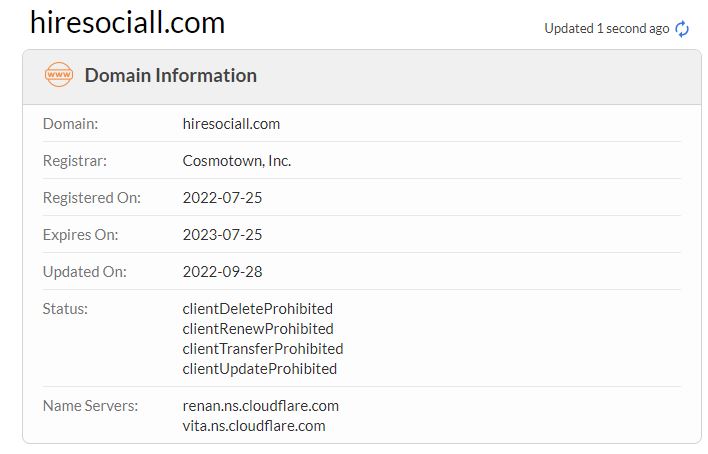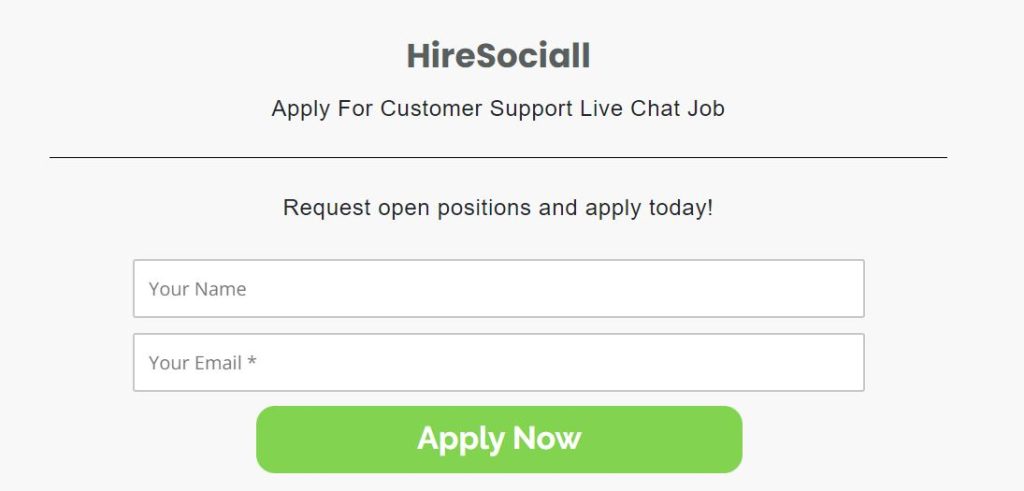review
Hiresociall scam or legit? Work From Home Online Jobs

Are you seeing a job posting from a company called “Hiresociall”? They claim to be hiring for remote jobs.
We will be sharing a short review of the website. Continue reading below.
Hiresociall scam or legit?
Hiresociall.com is a scam.

The website is new. The domain was registered in July.
Everything about the website speaks scam (no contact page or physical address, no social media account, and no details about the founder or staff).

The website will ask for your name and email address and send you to a third-party website after several redirects.
Job Scams
Fake job scams come in a variety of forms, but the majority share common characteristics that you can use to identify the scam before becoming a victim.
Interviews are usually conducted via Google Hangouts or another similar online service.
Their English will be sloppy, and they may be reusing a script, so Googling unique-sounding parts of the email may be useful. They will offer high wages for the work being done, and they will “hire” you by telling you that you are hired, rather than going through the normal process that a company in your country goes through when hiring an employee.
It is a fake check scam if they mention a check or receiving and sending out transactions.
It is a parcel mule scam if they mention receiving, processing, or inspecting packages.
An advance-fee scam occurs when you are asked to purchase items in advance, pay a fee to be hired, or purchase gift cards.
If the job entails posting ads on Craigslist or eBay, they will use you and your account to defraud people.
It’s a scam if the job involves Bitcoin ATMs.
How to Avoid a Job Scam
Take these precautions to protect yourself from job scams before accepting or paying for a job offer.
- Do an online search
- Talk to someone you trust
- Don’t pay for the promise of a job
- Never bank on a “cleared” check
How does a scam website take advantage of you?
Scam websites rely on social engineering — exploits of human judgment rather than technical computer systems.
Scams that use this trick rely on victims believing a malicious website is legitimate and trustworthy. Some are purposefully designed to look like legitimate, trustworthy websites, such as those run by government agencies.
Websites intended for scamming are not always well-designed, as a careful eye can reveal. To avoid detection, a scam website will employ an important component of social engineering: emotion.
An attacker can use emotional manipulation to get around your natural skeptical instincts. These con artists frequently attempt to elicit the following emotions in their victims:
- Urgency: Time-sensitive offers can cause you to act without thinking critically.
- Excitement: Attractive promises, such as free gift cards or a quick wealth-building scheme, can elicit optimism, leading you to overlook any potential drawbacks.
How to identify fake websites
Fortunately, there are several simple ways to protect yourself from scam websites and keep your family and wallet safe as you navigate the World Wide Web.
You can better protect yourself against these threats by following below:
- Emotional language: Does the website use language that may arouse your emotions? Proceed with caution if you have a strong sense of urgency, optimism, or fear.
- Inadequate design quality: It may seem obvious, but take a close look at how a site is designed. Is it designed with the skill and visual quality that you would expect from a legitimate website? Low-resolution images and unusual layouts can be indicators of a scam.
- Look for spelling errors, broken or stilted English, or really obvious grammar mistakes, such as the incorrect use of plural and singular words.
- Absence of identifying web pages: Additionally, a proper business website should have basic pages, such as a “Contact Us” page and a “About Us” page. If you’re unsure, call the company. Be cautious if the number is a mobile phone or if the call is not answered.
How to avoid scam websites
- Check the domain name: You can use sites like Whois.net to find out who registered the domain name or URL. Searches are free of charge. You can look up the domain’s registration date and year.
- Is it too good to be true? : A successful fraudster practice is the promise of luxuries beyond your wildest dreams in exchange for a moment of your time or minimal effort. Always question whether something appears to be too good to be true.
- Conduct an internet search: If you’re still undecided about a website, do some research to see what other people are saying about it on the internet. A reputation, whether good or bad, spreads quickly online. If others have had a negative experience with a website, they are most likely discussing it online. Look for reviews on sites like Trustpilot, or Sitejabber to see if a site has ever scammed anyone. If you can’t find a negative review, don’t assume the best, because a scam website could be brand new. Take into account all of the other factors to ensure that you are not the first victim.
- Use a secure connection at all times: When you visit a legitimate site that requests financial or secure information, the company name should appear next to the URL in the browser bar, along with a padlock symbol indicating that you’re connected to a secure connection. If you don’t see this symbol or your browser warns you that the site’s security certificate is out of date, this is a red flag. Always use high-quality security software to add an extra layer of protection to your personal security.
Conclusion
The website is a scam and should be avoided.












